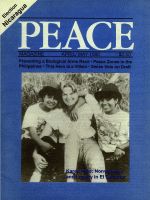
Peace Magazine Apr-May 1990, page 25. Some rights reserved.
Search for other articles by Marko Hren here
WHEN the Swiss held a referendum last year to consider dismantling their Army, even the most optimistic didn't reckon on more than 25% support. Surprise! At the final count over 33% favored abolition. In fact, two of the 26 cantons supported the proposition.
The referendum itself did not provoke any great outbursts among the populace. However, interest was by no means confined to pacifists or marginal idealists-all the more reason to wonder why a third of the country was ready to end a traditional institution. The Swiss may have arrived at a historic point in their attitude toward the military.
During the past twenty years, Switzerland was hardly involved in the anti-nuclear movement. In 1982, a group of young socialists asked a question: Does the nation really need an army? Three years later they launched an initiative to gather 100,000 signatures before they could ask fora referendum. During that period these advocates of abolition were seen as radicals unworthy of seri-ous consideration. Others viewed them as enemies of the state.
The Swiss parliament only had two deputies who favored abolition during the 1985 referendum. A year earlier, voters were asked if they regarded conscientious objection as a human right, and whether alternatives to military service could be made available. Compared to the question of abolition, this earlier referendum did not spark much interest-although each year, some 500 conscripts, excluding those who cite medical grounds, attempt to avoid the draft as conscientious objectors.
SUBSEQUENT attempts to include women as conscripts have led many womens' groups to join the ranks of Group for Switzerland without an Army (GSOA), who spearheaded the abolition stance. Their logo shows a cow astride a map of Switzerland, munching on a 1000 Swiss Franc bill.
In this era of rapid political transformation, some see this as a sign that the Swiss may well be ready to contem-plate better ways of using the funds currently spent on their Army. What was once considered utopian or even treasonous may now be plausible.
GSoA derives its support from progressive citizens who are not necessarily driven by ideological objectives. Sometimes they are accused of failing to offer pragmatic steps that would show how the orderly dissolution of the military apparatus could be proven to be advantageous. They see themselves as a group whose role is only to challenge deeply rooted assumptions that have become anachronistic. Similar movements are emerging in Germany, Yugoslavia and Hungary.
Marko Hren is setting up a peace centre with other activists in Ljubljana.

Peace Magazine Apr-May 1990, page 25. Some rights reserved.
Search for other articles by Marko Hren here